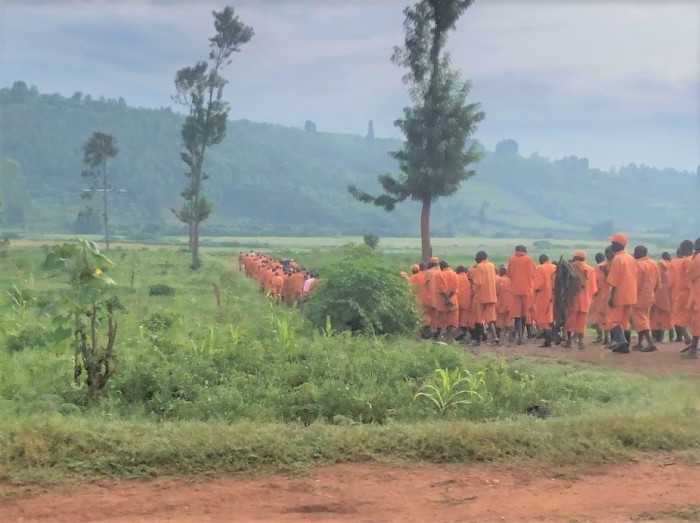
SOUTHERN PROVINCE, Rwanda — Callixte Karemangingo was among the thousands of Rwandans incited by extremist propaganda and nefarious leaders in government to carry out one of the worst atrocities the world has ever seen.
But that was before he became a Christian and realized he had spiritual gifts.
During the Genocide against the Tutsi in 1994, Tutsis looking to keep their lives were told to go to certain locations where they believed they would be safe.
As countless Tutsis gathered at these locations (in many cases churches or places of worship), many of them turned out to be slaughter traps.
Despite being a predominantly Christian nation, over 800,000 Tutsis and moderate Hutus were killed in the span of three months, from April to July 1994, by enraged Hutus and military forces. Neighbors killed neighbors and Christians killed Christians.
Callixte, a Hutu cattle farmer living in the Nyamagabe district, was among the Hutus who led his Tutsi neighbors to a "safe" place in their community despite knowing that was the place where they'd be executed.
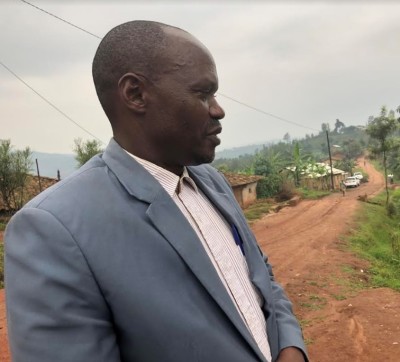
Some of them were people he considered friends. But those relationships didn't stop him from leading them to certain death.
Why? Because there was hatred in his heart that was inspired by toxic extremism and government propaganda that led Callixte and tens of thousands of others to believe that Tutsis were the enemy of the Rwandan state.
But after the genocide ended and the rise of a new government, Callixte was sent to jail in May 1995. He was there along with thousands of other genocide perpetrators and even Hutus who had nothing to do with those crimes against humanity.
Spending five years in prison, Callixte eventually began a personal relationship with Christ.
"[I repented] on Feb. 8, 2000. That is when I had my revelation," Callixte told reporters who visited him, his wife, and their friends while on a trip with the humanitarian agency World Vision. "I had a voice telling me that the air is going to blow but the one who has repented of his sins from the bottom of his heart, that air will do nothing to him."
It was at that point that Callixte took his relationship with Christ to a new level. He was preached to and started reading the Bible on a consistent basis.
"That is when I started repenting of my sins, each and every sin. I mainly focused on the sin of participating in genocide," he said through a translator in his native tongue of Kinyarwanda.
"I was thinking about the Rwandans who were blamed for their tribe when they were not the ones guilty themselves. When I would think about it, I would just bust out and start crying."
Inspired by the word of God and the teachings of reconciliation and unity promoted by the Rwandan Patriotic Front, which rose to power following the genocide and end of the Rwandan Civil War, Callixte said he made the decision to live a godly life.
He said he knew that he should listen to the "good leadership" that rose to power in his country instead of the "bad leadership" that enabled the genocide to occur.
Songs of peace and reconciliation
As a musician, Callixte's change of heart inspired him to compose songs centered around love, unity, peace and reconciliation. He said he could prophesize through music.
"Those songs actually touched people's lives, mostly the prisoners, and they started to change their ways," he said. "When I started composing those songs, they started moving me [to different places] in other districts to sing those songs. I even went to the city to sing those songs."
Callixte also said he began preaching inside the overcrowded prison.
"I became a teacher of the community court within the prison. I could teach them about living with others," he explained. "I could always emphasize on the fact that God told me whoever asks for forgiveness, he would be forgiven."
At first, he said, his fellow prisoners were still influenced by the ideology that got them into prison and rejected his teachings. But eventually, he said, many prisoners started listening to him.
As a musician, Callixte got involved in different competitions where he sang songs and was even rewarded for it. Even though he was still a prisoner, he said the government allowed him to keep the money he earned from those competitions.
As he became a vocal leader among the prisoners, he said he helped lead at least 8,600 prisoners to repentance with many of them coming to know Christ.
"The number [8,600] is really small compared to the number of people that requested for forgiveness and were released because they told the truth," he said.
One of the main Bible passages Callixte would recite while preaching in the prisons was 1 Corinthians 1:1-30.
That passage calls for believers of Christ to be “perfectly united in mind and thought” — an idea that might have seemed far-fetched considering the ethnic tension that had existed in the country for at the time.
Callixte's request for fellow prisoners to repent of their sins was aided by the fact that the Rwandan government had launched an initiative allowing perpetrators to seek forgiveness through local community "Gacaca" courts.
The Gacaca initiative presented not only the opportunity for perpetrators to seek forgiveness of their crimes from their victims but also for community members to decide what a perpetrator's punishment should be.
This initiative was launched as there were too many cases for the nation's judiciary system to handle in a timely manner.
"Many people came to know Christ and confess their sins. I was preaching on two things: the Gacaca government directive and the word of God," Callixte recalled. "So for me, asking for forgiveness was not that difficult."
An old friend turned bitter enemy
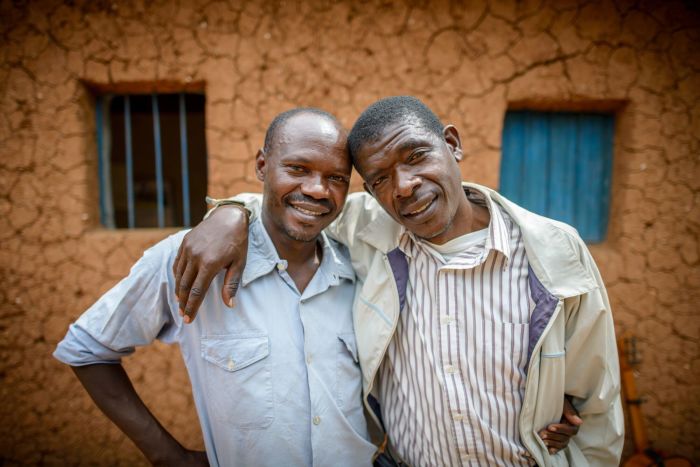
In the immediate years after the genocide, Callixte, his wife, Marcella, and their children had a deep resentment for their neighbors Andrew Birasa, his wife, Madrine, and their children.
Andrew, a Hutu coffee farmer who had known Callixte since they were young, was the person who implicated Callixte for his genocidal crimes, which created resentment between the two families.
Andrew was good friends with Callixte when they were growing up. There was peace and harmony in the village until the ethnic tension came to a head in the 1990s. The division between Andrew and Callixte came over the fact that Andrew had married Madrine, a Tutsi.
During the genocide, Hutus who married Tutsis were also seen as enemies and were considered "Tutsi lovers."
In 1994, Callixte was part of a large group of genocide perpetrators in their community responsible for the death of Madrine's parents and other family members.
While Callixte was in prison, the two wives would not speak to each other, their kids would not play with each other and their livestock could not dare go onto each other's lands.
But that all changed thanks to the evangelical Christian humanitarian agency World Vision Rwanda, which provided relief and reconciliation efforts throughout the country and in their community. Starting their programs in 1994, World Vision today is the largest Humanitarian agency present in the tiny, landlocked central African nation.
The two wives began volunteering for World Vision and the charity encouraged the families to forgive and be forgiven.
As the genocide was one in which neighbors trespassed against neighbors, World Vision and the Rwandan government knew that forgiveness and reconciliation would be central components in building a united Rwanda. Without those components, that resentment that neighbors on different sides of the genocide had would hamper any recovery efforts.
In prison, Callixte heard about the work that his wife and Andrew's wife were doing together through World Vision and started learning about peace and reconciliation.
Callixte was taken to the Gacaca court. He confessed of his sin and asked for forgiveness from Andrew and his wife. He also asked for forgiveness from all Rwandans.
"They forgave me, but mostly Andrew and his wife," he explained. "They forgave me and they took me out of prison and they pardoned me."
Andrew told reporters that although it was tough to forgive a man that killed his wife’s family, his family’s heart started changing “slowly by slowly.”
“Together with our good leadership and their advice to citizens, all that helped us to be transformed and live with each other," Andrew explained. "Those training sessions at the Gacaca court made it possible for communities to come together and discuss those who had come to seek forgiveness and those who had been offended."
“Today, we are good friends and our wives are good friends," he added. "Our children are good friends and there is a lot of love between the two families.”
Working together
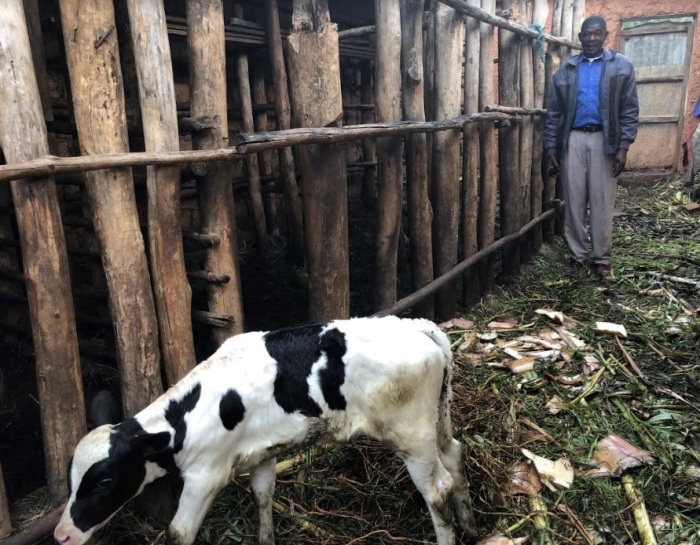
Having reconciled, Andrew and Callixte were able to discuss their feelings about what happened. Before going to prison, Callixte was quite good at making money by selling cattle.
To help make amends for his crimes, Callixte taught Andrew how to sell cattle.
"Now he does it even better than me," Callixte quipped. "We worked together in a way that is very good. What makes me happy is that my wife and his wife are so close. They share one heart."
Andrew also told Callixte about how World Vision enacted a program to hand out iron sheets to help provide homes with sturdy roofing. World Vision was also able to help Callixte build his house.
Additionally, Callixte and Andrew began working together when World Vision launched a project in which neighbors would have to combine plots to create bigger farms to grow coffee plants.
Through the program, groups of genocide perpetrators and survivors were given cows to create milk and fertilizer. The fertilizer would be used to grow coffee plants.
Andrew and Callixte were part of the same group responsible for harvesting the same coffee plants, forcing them to talk through the pain of what occurred years prior.
Two families become one
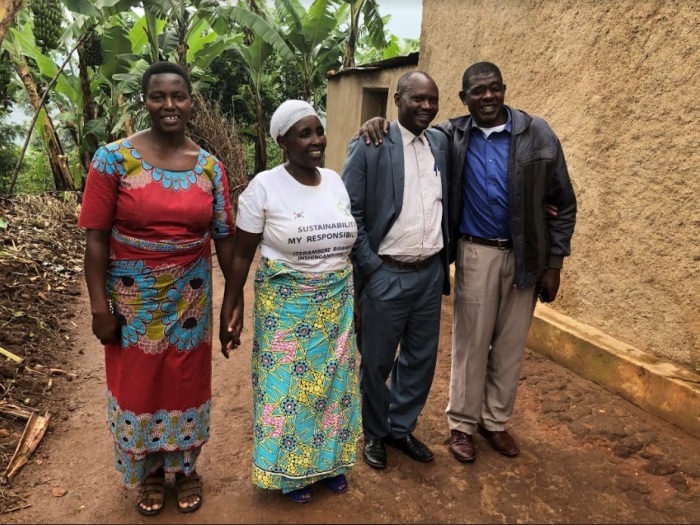
Andrew and Callixte's children saw the change in their parents’ relationships and also grew closer to one another.
Callixte's first-born son, Mizero Jean d'Amour (now 23), and Andrew's third-born, Chantal Irabaruta (now 22), grew insuperable.
As they went to school together, they would always try to sit next to each other in class.
"One would always be next to the other," Callixte explained. "They are so close that their love surpasses any love between a man and a woman."
Speaking with reporters in Andrew's home, the two couples were happy to announce that their children are planning to get married after they finish with college.
"For us, we are very happy with the fact that we both live together well as families and that people have come from far and wide to see us.
This meant that the two couples that used to be bitter enemies will one day become in-laws.
"As a family we support their plans and we would like to invite all of you to the wedding," Andrew told reporters. "We keep saying that it is God who did this. With [just] human strength, this would not have been possible at all."
Callixte's prophecy
Because of their story, World Vision invited both Andrew and Callixte a few years ago to travel to Chicago to share their experiences. They were both excited for the opportunity.
World Vision paid for Andrew and Callixte to stay in a hotel in the capital city of Kigali prior to their flight. But in Kigali, Callixte said he got a vision from the Holy Spirit telling him that he would not be able to go on the trip to Chicago.
He told Andrew about the vision and Andrew was not happy because he thought that meant that he would not be able to go as well. But Callixte assured Andrew that he would indeed go on the trip.
"When I kept praying, God would tell me that I am not going to go," Callixte explained. "We kept on praying while at the hotel to see if God was OK with us going. When he got his Visa and I didn't get mine ... I was at peace because God told me that I wouldn't get to go."
Callixte additionally told Andrew that he bring a gift back for him. That is exactly what happened, the men say.
Andrew went on the trip and received two gifts. Andrew himself received a synthesizer. He was also given a new guitar to bring back to Callixte. The new guitar was much better than the one that Callixte had already owned.
"It helped Callixte improve and work on his music career," Andrew said. "He is [now] invited to different places to play the guitar."
According to Callixte, many Rwandans believe that Christians musicians may also be prophets.
"I have both of those gifts. God gave me discernment,” Callixte said. “I am sometimes able to see something before they occur. Sometimes I can do that for others as well and tell you about your prophecy."
Andrew told the journalists that he ended up giving the synthesizer to the local church in their village. He added that the synthesizer helped the church to grow.
"People became more and more interested with a musical instrument and even more people get saved," Andrew said.
The two families became a model for reconciliation and others wanted to learn from them and hear their story.
"For us, we are very happy the fact that we both live together well as families and that people have come from far and wide to see us," Madrine, a mother to seven children, said.



